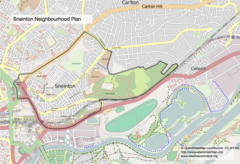Sneinton
| Sneinton | |
|---|---|
 Boundaries of Sneinton |
|
| Sneinton shown within Nottinghamshire | |
| Population | 12,689 (2011) |
| OS grid reference | SK5839 |
| District | |
| Shire county | |
| Region | |
| Country | England |
| Sovereign state | United Kingdom |
| Post town | NOTTINGHAM |
| Postcode district | NG2 |
| Dialling code | 0115 |
| Police | Nottinghamshire |
| Fire | Nottinghamshire |
| Ambulance | East Midlands |
| EU Parliament | East Midlands |
| UK Parliament | |
Sneinton (pronounced "Snenton") is a village and suburb of Nottingham, England. The area is bounded by Nottingham City Centre to the west, Bakersfield to the north, Colwick to the east, and the River Trent to the south. Sneinton now lies within the unitary authority of Nottingham, having been part of Nottinghamshire until 1877.
Sneinton has existed as a village since at least 1086, but remained relatively unchanged up until the industrial era, when the population dramatically expanded. Further social change in the post-war period left Sneinton with a multicultural character. Sneinton residents of note include William Booth, founder of The Salvation Army, and mathematician George Green, who worked Green's Mill at the top of Belvoir Hill.
The history of Sneinton is inextricably tied to that of its near neighbour, the City of Nottingham. When the area that is now Nottingham was settled by the Anglo-Saxon chieftain "Snot", he named the settlement "Snottingham" (the homestead of Snot's people, where inga = the people of; ham = homestead), and the area east of the city, also settled by Saxons, was called "Snottington" (the suffix ton = farmstead settlement). Sneinton is mentioned in the Domesday Book, where is referred to as "Notintone", which represents the Norman pronunciation of an Anglo-Saxon placename, with the "Sn" dropped in favour of "N", which was easier to say in the Norman language. The Norman pronunciation of "Nottingham" stuck, whereas their pronunciation of "Notintone" did not. In the years between 1086 and 1599, "Sneinton" became the agreed way of spelling the village name.
...
Wikipedia

